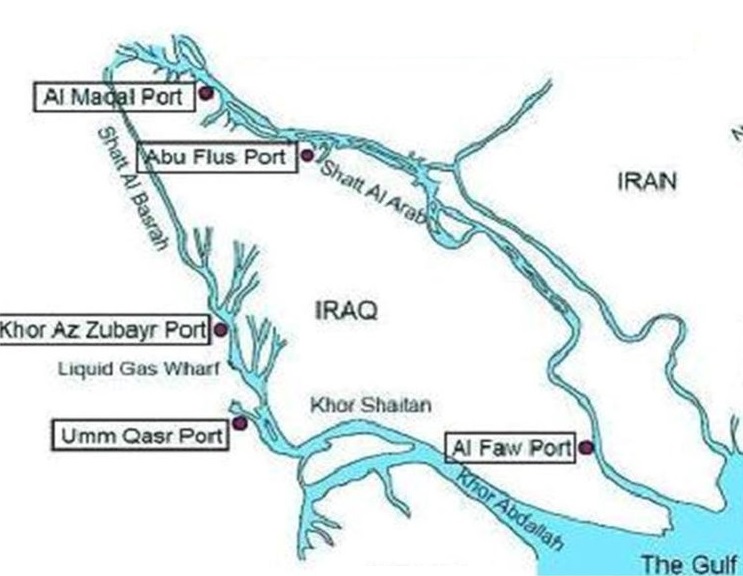Situated in West Asia, Iraq boasts a burgeoning economy with vast potential. The cornerstone of its economy lies in the oil export sector, which significantly contributes to the nation’s GDP and foreign exchange earnings.
Iraq’s ports play a pivotal role in facilitating oil exports, serving as vital components of the nation’s economic infrastructure. Despite facing political challenges, Iraq has embarked on several port development and expansion initiatives to bolster its maritime sector.
However, the overreliance on oil has marginalized other sectors, leading to high unemployment rates, affecting approximately 25-30% of the population.

Under the auspices of the Iraqi Government, the General Company for Ports of Iraq oversees the management and operation of the nation’s ports, established in 1919 under the Ministry of Transport.
Umm Qasr Port:
Situated along Iraq’s Gulf Coast, Umm Qasr stands as the nation’s primary seaport and its only deep-water port. It handles the majority of Iraq’s export trade and comprises three distinct port zones: Umm Qasr South Port, North Port, and Umm Qasr Mid Port. Each zone operates under different authorities and accommodates various port operations, including cargo handling, storage, and warehousing.
With 21 berths spanning approximately 5000m, Umm Qasr is expansive and well-connected to major oilfields in southern Iraq. It serves as a multi-purpose port, capable of handling diverse cargo types, including liquid and dry bulk cargo, containerized cargo, and general cargo. Equipped with modern facilities, the port can accommodate ships weighing up to 5000 TEU, handling substantial container traffic monthly.
South Port:
Established in the 1940s, Umm Qasr South Port primarily offers storage facilities for containers. Private companies provide equipment for private cargo operations, while the Iraqi Port Authority ensures efficient operations through an electronic gate control mechanism.
North Port:
Built in the 1970s, North Umm Qasr Port has become Iraq’s busiest port, capable of handling bulk cargo, containerized cargo, and Ro-Ro operations. While facing congestion challenges, the port boasts organized container yards and storage spaces, along with rail connectivity to Baghdad.
Port of Basra/Al-Maqal Port:
Located in Basra city near the Persian Gulf, Al-Maqal Port, established in 1919, has faced operational disruptions due to past conflicts. Despite being underutilized, efforts are underway to restore its functionality and enhance its capacity.
Al Basra Oil Terminal:
Critical for Iraq’s economy, the Al Basra Oil Terminal in the Persian Gulf handles a significant portion of the nation’s crude oil exports. Despite past damages, ongoing restoration efforts aim to maximize its operational capacity.
Khor Al Amaya Oil Terminal:
Situated southeast of the Shatt Al Arab River, Khor Al Amaya Oil Terminal, although facing operational challenges, plays a crucial role in Iraq’s oil export operations.
Abu Flous Port:
A commercial port on the western bank of the Shatt al Arab river, Abu Flous handles general cargo operations and is connected to Basra by road.
Al Faw Port:
Undergoing expansion, Al Faw Port is poised to become the largest port in the Middle East upon completion, promising significant economic growth for Iraq.
Port of Khor Al Zubair:
Located near the port of Umm Qasr, Khor Al Zubair Port handles exports of gas condensates and receives various commodities. Plans are underway to convert it into an oil port, reflecting Iraq’s strategic vision for maritime trade.


Latest Products
YDK Technologies MKN020 Gyro compass connection box
AED 3,960.0Original price was: AED 3,960.0.AED 2,850.0Current price is: AED 2,850.0.Onwa KM-8X 5-in-1 Marine Bundle Set Radome – GPS, Chartplotter, EchoSounder, AIS, Radar
8-inch GPS Chart Plotter with AIS and Radar
Onwa KM-8A (BUNDLE) 8-inch Color TFT LCD GPS Chart Plotter with Class B+ AIS Transponder MFD [BUNDLE]